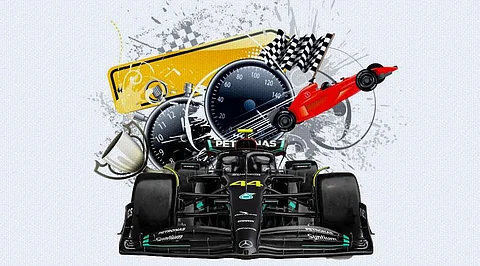

Technology has always been a major part of Formula One (F1). A team of engineers and scientists working to seize every advantage while utilizing the most recent advancements in data, analytics, and high-performance computers is behind every car racing around the track at 250 mph.
Computational Fluid Dynamics: One of the most crucial aspects of a car's performance on the track is its aerodynamics. Computational fluid dynamics is a discipline that studies the interaction of airflow with moving objects, such as cars, at high speeds (CFD). A significant application of technology in F1 today is performing complex analyses of this aspect of the car's performance.
Simulations, Digital Twins and Virtual Racing: F1 teams simulate billions of potential race parameters using AI-powered simulations to identify the factors that are most likely to produce successful results.
The impact of everything, including weather, rival behaviors, pit stop strategies, track conditions, crashes, and mechanical breakdowns, can all be forecasted more accurately than ever before thanks to partners like Amazon, Dell, and Oracle's cutting-edge data and analytics capabilities.
The Power of Partnerships: Partnerships with technology companies are a crucial component of both F1 teams' and the racing league's overall strategies. Teams may focus on the business of winning races by selecting the right strategic partners who can provide technical competence as well as fresh perspectives on how and where technology might be deployed.
Cloud Insights and Engagement: This study's final use case for data in Formula One focuses on delivering information that promotes more intense fan connection and participation. F1 is a complex sport, and spectators at home won't always be aware of everything that happens throughout a race. Cameras can only capture a single section of the track at a time, after all. Your view is considerably more constrained if you are sitting in the grandstand and attending in person.
Machine learning algorithms that use all the data sources at their disposal to construct a story about the race are used to find and highlight these insights. We project these data insights onto the screen for the audience to comprehend. We notice that the level of understanding is particularly valued by the fans.
The Future of Technology in F1: As applications like ChatGPT and Stable Diffusion have such enormous disruptive potential and are so well-liked, generative AI is currently a hot issue in the tech community. The future of the sport and, in particular, the spectator experience are two things that F1 organizers are really thrilled about.
As we've seen, Artificial intelligence and machine learning can really help with that. One thing is for certain: technology will continue to provide us with quicker, more potent, and aerodynamic cars and exciting, immersive experiences for fans. This will result in more closely contested racing action.
Join our WhatsApp Channel to get the latest news, exclusives and videos on WhatsApp
_____________
Disclaimer: Analytics Insight does not provide financial advice or guidance. Also note that the cryptocurrencies mentioned/listed on the website could potentially be scams, i.e. designed to induce you to invest financial resources that may be lost forever and not be recoverable once investments are made. You are responsible for conducting your own research (DYOR) before making any investments. Read more here.
